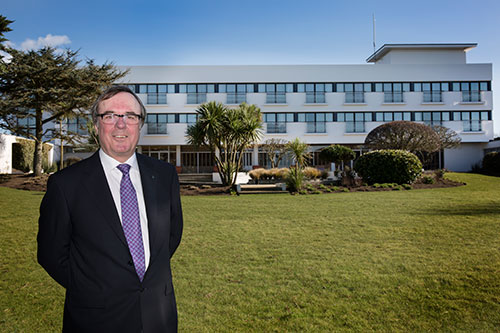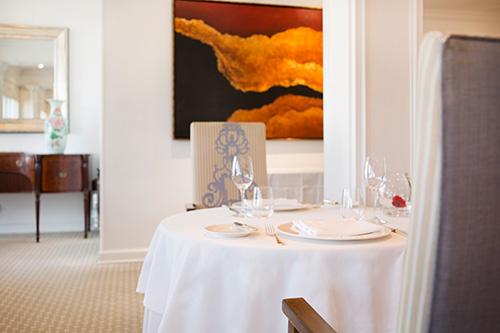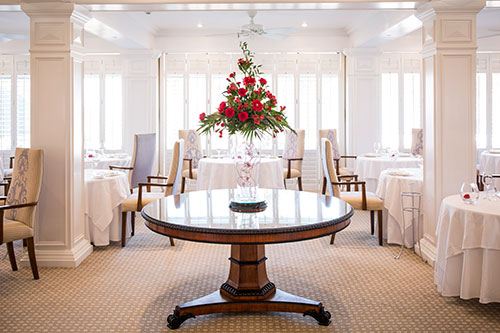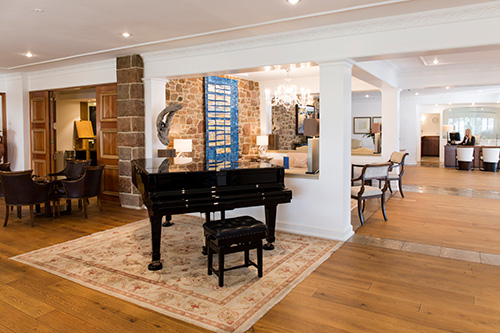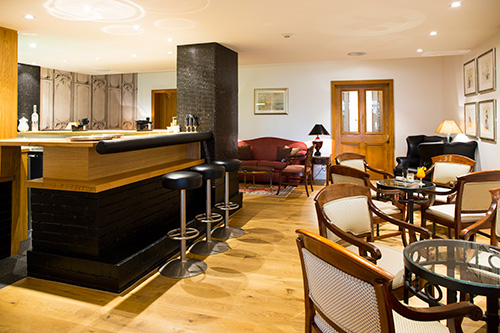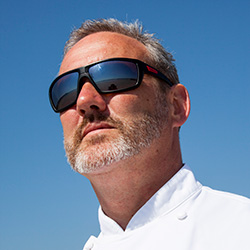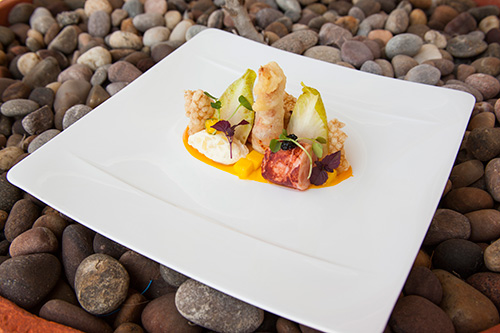The Caterer interview: Patrick Burke
The owner and managing director of the Catey-Award-winning Atlantic hotel in Jersey tells Amanda Afiya the story of its evolution
While you've lived in Jersey almost all your life, you're not a native, so how did you come to move to the island?
How easy was it to move to Jersey then?
Completely straightforward, I think. You just booked a ticket on a boat or a plane and you could buy here, there were no restrictions - those came much later. Quite quickly he found the Penguin hotel, a little guesthouse overlooking Portelet Bay, which is an idyllic setting. But sadly, things didn't work out for my parents - my mother didn't stay that long and left us a couple of years later, which was very difficult for my father.
And very unusual
Very unusual, yes, so my father was not only establishing the business but looking after me and my sister Joanna. After a number of years he remarried, which is why I now have a halfsister and some stepbrothers, but really the early years were very much in the Penguin and it was like all the Jersey hotels were in those days - a little guesthouse that had started as someone's home. Because the business was very seasonal and he was very ambitious, each year when the hotel closed he'd invest in it, which he did for a number of years, making it a bit bigger and a bit better, and here at the Atlantic, we still close in January each year in a very similar fashion.
After about eight or 10 years, he got to a point where he had taken the property as far as he could as the site was quite restricted.
You must have fond memories
I remember growing up around the kitchens. There was a little mangle in an area that was used for the laundry, and I remember learning what it did by foolishly putting my hand into it. Of course, those were the golden years for Jersey tourism and the island was booming, so the business did very well.
As a family, were you accepted by the islanders?
I often say that if you're an immigrant to Jersey you run a bit harder than a local establishment, so my father became president of the local hotel and guesthouse association and president of the local chamber of commerce. In those days there were around 600 hotels and guesthouses on this tiny island, so it was a big deal to be head of all that, especially as an outsider.
How many properties are there today?
Well, there are 70 hotels and most of the guesthouses are gone, so in terms of unit sizes it's much smaller, because in those days they would have had events with proprietors - maybe 300 or 400 - coming to industry dinners.
It's funny now that we're seeing the rise of Airbnb; they're guesthouses of sorts
Absolutely, that is exactly where it started on this island - people renting out a room in their house, and thinking "that's nice, I'm making a good income, I'll add another room…" and that's how it started.
Airbnb is a huge opportunity for the island because, actually, the Atlantic is all about small and small is beautiful (we've only got 50 bedrooms), but the industry needs volume. If you look at the beds (and we grew up counting beds, not rooms in Jersey, so it's very old-fashioned), there would have been 25,000 registered during its peak, and now there are fewer than half of that, so if we're going to regenerate, it needs new thinking, doesn't it?
It does, and it's refreshing to hear you say that because a lot of operators see Airbnb only as a disruptive element, but, of course, someone might come and stay on the island and aspire to come and stay here [at the Atlantic]?
They might come and stay here, they might come and have dinner here, they might go and have lunch at [the Atlantic's sister restaurant] Mark Jordan at the Beach. The fantastic attraction of Jersey is that it's an island, which makes it appeal to a lot of people, but of course to get here you need to travel by boat or plane, and the more demand there is for transport links, the better it is for everyone.
We have the most extraordinary links into Jersey; I think we have 45 different airports across the UK and some in mainland Europe, and that's critical to the industry. One of the reasons there are such wonderful opportunities for us as an island is because a lot of the things that work for our industry benefit, for example, the finance industry. It's very helpful to them if there are good hotels, good restaurants and good links. We now have EasyJet on the London route and I think that's a game changer.
So you outgrew the Penguin?
We very much outgrew the Penguin, but there was a lot of love there and my father really didn't want to lose it. We lived in a small house in St Brelade for a number of years, then when my father remarried he built a house in the north of the island. When they were building that they came across the site for the Atlantic - it had a 12-bedroom guesthouse, single storey, and I believe it was the only one on the island that was fully en suite at the time. I vividly remember the last days of the old Atlantic, roller-skating up the corridors!
How hard was it to develop the site?
It was very challenging because my father was only allowed to build on the footprint of the old guesthouse, which is why to this day we're quite tight for space. He had to borrow a lot of money and he was under pressure to let the Penguin go. However, Sir Billy Butlin, who had moved to Jersey, had bought the holiday camp next to the Penguin and he was also expanding. After some persuasion, he made my father an offer he couldn't refuse, and bought the Penguin for £66,000. It helped us out in those early days and very quickly the Atlantic [which opened in 1970] became successful because it was ahead of its time in Jersey.
When did you officially join the Atlantic?
My father had never said "you must come into the business", but I was growing up surrounded by it and during the summer holi days I gradually gained experience, washing up, making sandwiches and so on. When I got a bit older, he got me a job in the south of France and it was a very natural process - I knew one day there was a strong possibility that I might come back to the Atlantic.
So given that possibility I knew that every body would say "well he's just coming in to run this place because he's his father's son", and I thought if I'm going to do that I need to go out and prove to myself that I can do it. I left Jersey in 1969 and went on to university in 1974 and was there until 1978. That included a year out with Rank Hotels at the Royal Lancaster doing things in different departments, and six weeks up in Coylumbridge in Aviemore, working in a small hotel, which really resonated with me.
What happened next?
I went and trained at the Carlton Tower in Knightsbridge for two years, followed by three years at the Inter-Continental, where I ended up as an assistant manager, which I really enjoyed. I still wasn't ready to come back to Jersey so I went to work for Mark Warner, running its club in Meribel ski resort for a season. Then I went to work at its summer club in Corsica and then on to Verbier.
But after a couple of years of that I was exhausted, frankly, and I can remember sitting on a beach in Corsica, thinking about what was important in life, and of course family was important. The Atlantic had been really successful for 15 years at that point, but my father said he'd taken it as far as he could and he needed a fresh pair of eyes, so it all came together, and that's when I came back and joined him in 1985.
What were those early days like?
Business came in without too much difficulty, and for the first two years we spent a huge amount of time together, formulating ideas for the future, which was great. My ideas were not that different from those my father had a generation before, which was that while we had something that was successful, if we wanted it to go on being successful, we had to develop it further to high international standards, and that led to a process that lasted five years. We would close the hotel in the winter, improving it each year until 1993, when we had a property that had been reborn. It was in a state of the art condition, and we were able to go to Small Luxury Hotels of the World (SLH), which was just starting, and we became one of the first members.
What inspired me about that was trying to find people and properties that we could use as a benchmark, and I couldn't see anyone in Jersey who was doing quite what we were doing. I had a feeling that the industry here was going to contract significantly, and I was looking for reference points, and I think we found that through SLH. There are 500 members in SLH and many are astonishingly good, small hotels either family-run, in many cases, or independently run, and you find like-minded people who face the same challenges that you do. SLH isn't about helping each other operationally, it's purely about marketing, so it gives you some reassurance (that you're not completely bonkers).
There's an amazing property in Bordeaux, which I love going to because it's so beautifully conceived; it's so brave and it's so bold. It's the vineyard for Smith Haut Lafitte and the family that own it decided to start a cosmetics brand, and then a spa, then they decided that they should have a hotel for the spa, and it's all on this estate surrounded by vineyards, all done in a way that's a holistic approach. The property feels absolutely right in its location and they're committed to the highest standards. It inspires me to go to places like that.
Is your father still with us?
No, one of the very difficult things about family business is succession and sadly, although he had some great years after he retired, he developed Parkinson's disease. It was important to him that the hotel should go on, and by that stage I had acquired shares, so we were on a 50/50 basis. He died in 2007 and in his will he'd given me the right to buy out my sisters, which I did about three-and-a-half years ago, so I now own everything.
Just prior to the recession, there had been a boom in Jersey of either refurbishing or building new hotels, so there's been a tremendous oversupply here, which I'm still seeking to navigate. My father didn't see that recession, and we had about five years of really horrible trading. But in the past two years we've succeeded in stabilising our business levels.
It was particularly challenging here because we've always set out to run the hotel to the highest standards that we can and we've always been against discounting. It's not easy if you're sticking with what you believe are reasonable rates and your competitors are selling at whatever price it takes and that's one of the reasons that led to the formation of Luxury Jersey Hotels, which was a strong belief on my part that if all the hotels were going to undercut each other, then it wasn't going to help anyone and that we needed to come together and try to get more business to the island. That's had some success but I also think that Jersey suffered in terms of its image for a long time because all the success of the 1970s and 1980s created a brand that was very bucket and spade. We're getting the message out there that Jersey has changed [in terms of sophistication], and it really has, because there are some very good hotels here now.
So where did you go from there?
Having got to the point in 2007 when everything started to become extremely difficult, and not wanting to get into the discounting war, I decided to put every ounce of effort into our marketing. Since then, we've added layer upon layer of activity, making sure we had a world-class website, invested strongly in PR, digital marketing and so on.
I'm sure this is what has helped us rebuild our volumes and, as part of that, we've learned to become good at PR and we've had a surprising, growing flow of media, but it took time to build that awareness. We've taken on some really strong new people in the past few years, including Stephanie [Paddock], our marketing manager; Scott [Andrews], our hotel manager, who came from Gidleigh Park; and Richard [Burton], our head sommelier, who came from Midsummer House - we're now attracting a very high calibre of staff to Jersey.
We've invested in technology, including Opera, the international property management system. We've renewed all of our computers, we've got the latest, two-way interface with the SLH reservation system, so we're one of the first out of 500 hotels to achieve that, which is amazing. We've invested in a channel manager, which means after the SLH platform we're going to be able to distribute inventory in real time to OTAs, so they'll get last room availability in the hotel, and this little Jersey hotel will have state-of-the-art pricing.
You were just saying about working collaboratively with the other hoteliers, yet that's obviously a very competitive approach
Oh no, I don't think so, because they're all doing this anyway. We've operated for many years on a pricing system that has evolved through seasonality, through offers, but essentially a fixed approach. Just about every hotel in the country operates a flexible approach, and the price will change from day to day. Having studied the market closely, not just in Jersey, it's not often done in a terribly professional way and that can be very destabilising.
Essentially, we will come out with a system that is structured, is carefully thought through, that doesn't change wildly from one day to the next, but enables us to move, to some degree, with the market because we have other systems now that are monitoring our competitors, but will give us a dynamic answer.
You held your first Eat Jersey food festival at the hotel last November. How did that come about?
Eat Jersey (see below) is driven by the idea of putting Jersey on the map, and through that hopefully our brands: the Atlantic hotel, Ocean restaurant, Mark Jordan at the Beach. Mark and I see it as becoming integral to everything that we do and bringing another level of interest to what we're doing. We're already talking about next year's festival. So Eat Jersey is really about marketing.
You involved Steve Smith from Bohemia at the Club Hotel & Spa, Jersey, and Simon McKenzie from the Brasserie restaurant at the Old Government House Hotel & Spa, Guernsey, but did you think of doing it as a stay here one night, stay there one night?
I see the opportunity in future years to involve other venues, and what we've discovered, which is a great surprise, is that it's hugely expensive to put on something like this and there's a lot of hard cash associated with PR, advertising, with getting people to Jersey, so on and so forth, that we're seeking to recover as much as we can through sponsorship. So what we would say to someone in year two or year three is come and be part of what we're doing, but please give us a contribution to that marketing cost.
I think we need to give this three years to be successful, I don't think you can do it in one year, and anything that we're trying we give that sort of timescale to prove itself, but if after that time we could do this and actually not lose any money that would be a win because the win comes in the recognition; it doesn't come financially.
And although there are various metrics in place, you can't completely measure the impact of doing something like that and whether or not it's inspired someone to come at a later stage
It's very difficult. Everything that we've ever done over the years is one small step leading to another and you keep going and you keep committed and it's surprising what you can achieve over time. I could imagine, for example, that we might see more media next year because they might have heard of us through Eat Jersey and that would be a win .
Eat Jersey is about helping to put Jersey on the map, and the relationship with Mark has been very much like the hotel; an entirely organic process. There wasn't a road map or a desire on my part to make the food a more important part of the process.
People say "oh, you must be a passionate foodie", well I'm not. The interest is in trying to run every aspect of our hotel to the highest possible standards that we can. We'd had, for years and years and years, innumerable awards for service, and I thought we could do better with the restaurant if we tried, and that's when Mark came to join us.
How did Mark come to join you?
Mark worked with Keith Floyd and Jean Christophe Novelli at Gordleton Mill in Lymington in his formative years, before joining the Pink Geranium, followed by Gilpin Lodge, so he'd always been around finedining establishments.
He came to us in 2004 - taking on his first head chef role - and gained a Michelin star in 2007. As he'd never had a Michelin star before, and we'd certainly never had one, it was a journey that started together. I think his style is quite unusual in the sense that he is an excellent chef, but his cooking is quite straightforward. He's passionate about local ingredients, and he does as little as he can to those ingredients, so there's a lack of fussiness, and if you think about what you see in this hotel, the whole approach over the years, there is a lot of quality built into this operation but it's all quite understated - it's not fussy. We're trying very hard not to take ourselves too seriously, because we've all been to a country house hotel where everybody becomes quite uncomfortable.
We all evolve and that's what it's all about, but there's a chemistry that seems to work between him and me, and between him and the hotel, and I think there's a fundamental trust that's really important.
Together with Treena and Magda [Mark's wife] we set up our restaurant Mark Jordan at the Beach in St Peter in 2011 as a joint venture.
So looking ahead, what will happen to the hotel in years to come?
I've been quite busy, so I haven't had much time to sit around worrying about it, and the process that I've been through with the succession, from father to son, has meant I cannot not think about it.
I'm conscious that in four years' time we could be 50 years as a family business, which makes quite the milestone, so I'm hopeful that we can still be here then. I believe that what's more important than a son or sons saying they'd like to become involved is that I haven't finished steering this business out of the challenges I was describing earlier. It's not the holy grail but I come back to the importance of the revenue system because Jersey is a really costly place to operate in. We're running a seasonal business where you've got costs all year round, with serious revenue just through the main season, so I'm more interested in the sustainability of the business. That means continuing to reinvest, and knowing that we're making enough money to be able to do that long term.
This autumn marks the return of the Eat Jersey food festival at the Atlantic. From 3 to 6 November, executive head chef Mark Jordan will be joined for a second year by a line-up of renowned chefs from the Channel Islands and Britain in a celebration of the gourmet produce and fine-dining in Jersey.
Over the course of four days, diners can choose to attend four gastronomic events at the Atlantic's Michelin-starred Ocean restaurant as well as a relaxed beachside feast at Mark Jordan at the Beach.
Last year, guest chefs included Steve Smith, Simon McKenzie, Philippe Hardey from Restaurant Le Mascaret, Basse-Normandie, The Caterer contributor Russell Brown, Adam Smith, Pascal Proyart and Michael Wignall.
The Atlantic
Total number of rooms 50
Total number of staff (across the Atlantic and Mark Jordan at the Beach) 80
Annual turnover £4m
Average room rate £145
Total revpar £77
Awards and accolades 2016 Condé Nast Johansens Awards for Excellence - Best Dining Experience and Best Champagne List; Food and Travel Reader Awards 2015 - Best International Hotel;
2014 Hotel of the Year - Independent Catey; four AA red stars, four AA rosettes, one Michelin star
Address The Atlantic Hotel & Ocean Restaurant, Le Mont de la Pulente, St Brelade, Jersey JE3 8HE
Patrick Burke shows us around the Atlantic
Continue reading
You need to be a premium member to view this. Subscribe from just 99p per week.
Already subscribed? Log In



